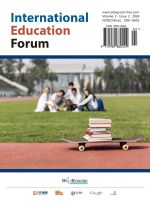Abstract
Reading comprehension skills among Alternative Learning System (ALS) learners play a vital role in educational development, enabling individuals to understand various forms of written information. This study shed light on the profile of ALS Accreditation and Equivalency (A&E) learners and their reading comprehension skills. It highlighted the significant differences based on profile variables and identified their challenges in developing reading comprehension skills. The proposed project offered a comprehensive approach to enhance reading comprehension among ALS A&E learners. This study utilized a descriptive method, involving a sample of 90 ALS A&E learners from various ALS centers. Data were collected through survey questionnaires and interviews. Descriptive statistics were employed to provide statistical descriptions of the variables and indicators studied. Based on the findings, it was concluded that the study’s respondents were predominantly teenagers and young adults, with a noticeable lack of middle-aged adults. Moreover, female respondents exceeded male respondents, and most of the respondents came from low-income households. The respondents agreed on the importance of further enhancing reading comprehension skills among ALS learners. Furthermore, the study indicated that factors such as age, sex, and socioeconomic status had minimal or insignificant influence on the reading comprehension skills of ALS learners. The research also identified challenges faced by ALS learners in their pursuit of improved reading comprehension skills, emphasizing the necessity for specialized reading-focused sessions to effectively address the challenges and enhance these skills.
References
SDS ADMIN, 2019, Alternative Learning System, viewed July 15, 2023, https://sdg.neda.gov.ph/alternative-learning-system/
DepEd Order No.13, 2019, Policy Guidelines on the Implementation of Enhanced Alternative Learning System 2.0, ALS-Issuances Department of Education, viewed July 15, 2023, https://www.deped.gov.ph/wp-content/uploads/2019/06/DO_s2019_013.pdf
DepEd Memorandum No.022, 2023, Guidelines on the Conduct of Presentation Portfolio Assessment for Alternative Learning System Accreditation and Equivalency for Elementary ND Junior High School for the School Year 2022–2023, ALS-Issuances Department of Education, viewed July 15, 2023, https://www.deped.gov.ph/wp-content/uploads/DM_s2023_022.pdf
Woolle G, 2011, Reading Comprehension: Assisting Children with Learning, Springer, Dordrecht.
Middlewood D, Abbott I, Pamas R, 2021, Leading Disadvantaged Learners: From Feeling a Failure, Bloomsbury Publishing Plc., Bloomsbury.
National Research Council, 1998, Preventing Reading Difficulties in Young Children, The National Academy Press, Washington, DC.
Abadzi H, 2003, Improving Adult Literacy Outcomes: Lessons from Cognitive, The World Bank, Washington, DC.
Arzadon MN, Jr Nato RR, 2015, The Philippine Alternative Learning System: Expanding the Educational Future of The Deprived, Depressed, and Underserved, Institute for Adult Learning, Singapore.
World Bank Group, 2018, A Second Chance to Develop the Human Capital of Out-of-School Youth and Adults, viewed July 15, 2023, https://elibrary.worldbank.org/doi/abs/10.1596/30064
Information Resources Management Association USA, 2021, Research Anthology on Research Education and the Development of Lifelong Learners, Information Science Reference, Hershey, PA.
Cornoldi C, Oakhill J, 2013, Reading Comprehension Difficulties, Processes, and Intervention, Lawrence Erlbaum, Associates Inc., New Jersey.
McNamara D, 2007, Reading Comprehension Strategies Theories, Interventions, and Technologies, Lawrence Erlbaum, Associates Inc., New Jersey.
Rabourn KE, Shoup R, BrckaLorenz A, 2015, Engagement and Support of Adult Learners. The Online Journal of New Horizons in Education, 6(4): 1–32.
Atilano EB, Omanito RAG, Desipeda CJ, et al., 2016, Factors Influencing the Dropout Rate in Alternative Learning System-Accreditation and Equivalency Program. The Online Journal of New Horizons in Education, 6(4): 99–108.
Sukmawati L, 2015, An Analysis of Students’ Skill on Identifying Supporting Details in Reading Text at Fourth Semester Students of English Study Program in University of Pasir Pengaraian, dissertation, University of Pasir Pengaraian.
Malamon D, 2020, Developing Reading Comprehension in the 5th and 6th Forms, thesis, Ferenc Rakoczi II Transcarpathian Hungarian College of Higher Education.
Lin LF, 2019, Senior High School Students’ Reading Comprehension of Graded Readers. Journal of Language Teaching and Research, 1(1): 20–28.
Carr JF, Harris DE, 2019, Succeeding with Standards Linking Curriculum, Assessment, and Action Planning, Association for Supervision and Curriculum Development, Alexandria.
Silor, et al., 2017, Effects of Attitudes and Motivation on Student Stereotypes. Alberta Journal of Educational Research, 2017(20): 270–277.
Gipps C, 2011, Beyond Testing: Towards a Theory of Education Assessment, Routledge, London.
Black PJ, 2009, Can Teachers Use Assessment to Improve Learning? Journal of Curriculum and Assessment, 5(2): 5–11.
Holgado J, 2019, Problems in Reading Comprehension in English. Ascendens Asia Journal of Multidisciplinary Research Abstracts Section, 3(2L).
Woolley G, 2020, A Critical Reading and Text Organization-Enhanced Writing Lesson. Issues EFL, 10(1): 75–80.
Vaughn S, 2017, Reading in a Foreign Language: A Reading Problem or a Language Problem? In Reading in a Foreign Language, Alderson CJ, Urquhart AH, (eds), Longman Pub Group, London, 1–27.
Esmaeili H, 2002, Integrated Reading and Writing Tasks and ESL Students’ Reading and Writing Performance in an English Language Test. The Canadian Modern Language Review, 58(4): 599–620.
